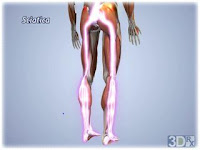Surgery contrasted with conservative care of Sciatica patients

Surgery contrasted with conservative care of Sciatica patients
Disc surgery may be a luxury that society cannot afford, Except for the few cases wherein an emergency loss of neurologic function occurs, most cases of disc herniations recover on their own with conservative care. The 30,000 failed spinal operations per year consume an "extraordinary amount" of societal resources.
During the first 6 to 8 weeks of care for herniated disc cases, little reason is seen to plan invasive management because only a small percentage of patients with herniated discs should consider surgical intervention. Long term results of surgery are only slightly better than both conservative measures and the natural history of a lumbar disc herniation.
Non surgial spinal decompression for herniated disc in NYC
Quality of Life after disc surgery
Disc surgery does not appear to return patients to work any faster or prevent long term disability any more effectively than nonoperative treatments. It does, however offer a significant benefit in terms of quality of life and symptom alleviation. In can afford 5 extra months of comfortable living over a 10 year period, compared with nonoperative treatments.
So with this information I am often asked - When does a patient with back pain and or leg pain become a surgical candidate?
Patients with a definite diagnosis of ruptured lumbar interverbral disc (IVD) and sciatica or other radicular pain with neurologic signs and symptoms should be carefully observed and treated by nonsurgical means for 4 to 8 weeks, unless the patient presents with progressive loss of motor,bladder or bowel function or has excruciating pain that canot be relieved by nonoperative measures.
Surgery seldom Necessary
The life time incidence of surgery for back pain and sciatica range from 1 to 3%; 50% of patients with disc hernia induced sciatica will recover spontaneously in 4 to 6 weeks. Although surgery hastens the recovery from disc hernia induced sciatica; it seems to have little influence on risk if recurrence.
Only 5 to 10% of symptomatic lumbar disc patients require surgery, and the best overall plan is to help patients avoid back disease by encouraging them to modify risk factors,provide them with preventive exercises, and teach them proper and improper methods of lifting.
Another question that is often asked is ok to delay a disc surgery and if so does it cause permanent nerve damage.
If a person undergoes surgery, regardless whether early or late,within a 12 week period, it does not really influence outcome in terms of future motor function.
In fact, a slightly increased risk is seen of sensory loss (feeling) if surgery is preformed too early.
There is the same long-term relief of pain. No evidence currently exists to intervene early with surgery- even when the patient has a dropped foot. If a person has cauda equina syndrome, however this is an acute surgical situation. The cauda equina syndrome occurs in only 1 to 2% of all lumbar disc herniations that come to surgery.
So the moral of the story is exhaust all Non-surgical options before surgical methods.
I utulize non-surgical spinal decompression in conjuction with physical therapy,Cox-flexion distaction technique, SpineForce Rehab and cold laser therapy in my practice
in NYC www.drshoshany.com
Comments